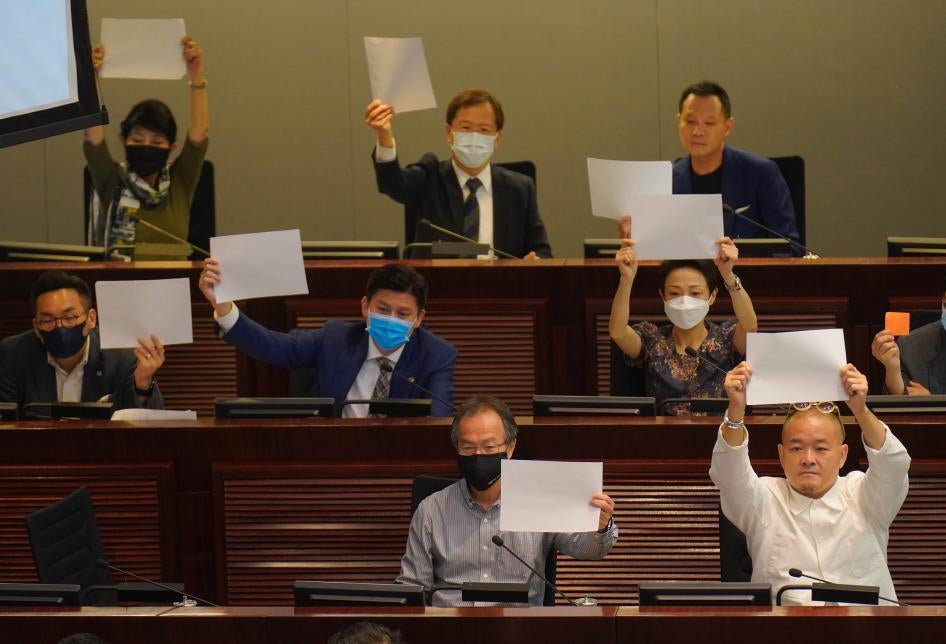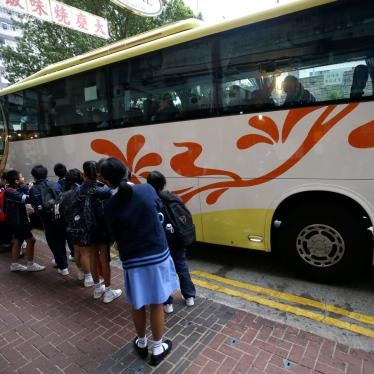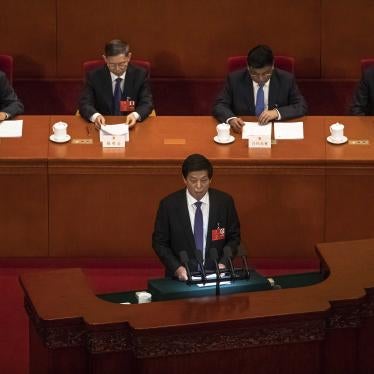(New York) – Hong Kong authorities have rapidly begun to apply the new National Security Law to prosecute peaceful speech, curtail academic freedom, and generate a chilling effect on fundamental freedoms in the city, Human Rights Watch said today. The law, which China’s government imposed on June 30, 2020, is Beijing’s most aggressive assault on Hong Kong people’s freedoms since the transfer of sovereignty in 1997.
The National Security Law also contains provisions whose long-term impact is likely to be devastating to human rights protections in Hong Kong. These include creating specialized secret security agencies, denying fair trial rights, providing sweeping new powers to the police, increasing restraints on civil society and the media, and weakening judicial oversight.
“Overnight, Beijing robbed Hong Kong people of their human rights,” said Maya Wang, senior China researcher at Human Rights Watch. “Long used to freedoms, Hong Kong people now face the prospect of lengthy prison terms for possessing banners or chanting slogans that the authorities dislike.”
Over the past month, Hong Kong police have invoked the security law at least four times during pro-democracy protests. They arrested 10 people during the annual July 1 pro-democracy protest and another person during a July 21 protest for possessing and displaying printed materials the authorities say promote Hong Kong’s independence.
Police now raise a National Security Law flag during protests to warn demonstrators that they can be arrested for “displaying flags or banners” and for “chanting slogans.” On July 2, the Hong Kong government decreed the 2019 protest slogan, “Liberate Hong Kong, the revolution of our times,” was illegal. One man was charged with “inciting subversion” and “terrorism,” after his motorcycle with a “Liberate Hong Kong” flag rounded a corner and crashed into a group of officers spread out across the road during the July 1 protest, an episode captured on video.
The National Security Law is forcing politically engaged individuals and groups to change how and where they participate in political activities. Hours after the Chinese government passed the law on June 30, one of Hong Kong’s most prominent pro-democracy political groups, Demosisto, disbanded due to concerns over the law. One of its leaders, Nathan Law, left Hong Kong. Two pro-independence political groups run by young people, Studentlocalism and Hong Kong National Front, have also disbanded in Hong Kong, but said they will continue their work abroad. On July 9, days before a planned “democratic primary” – an informal poll organized by Hong Kong’s pro-democracy parties to coordinate candidates for the Legislative Council (LegCo) elections in September – the Hong Kong secretary for mainland and constitutional affairs, Erick Tsang, warned that those who organized and participate in the poll might be in violation of the security law.
On July 10, the evening before the poll began, police raided the poll organizers’ office – headed by scholar Robert Chung – on suspicion of “dishonest use of computers.” Despite these efforts of intimidation, over 610,000 Hong Kong people participated in the July 11-12 primary. Afterward, two organizers of the primary, Au Nok-Hin and Andrew Chiu, quit their roles citing concerns over the security law.
On July 26 and 27, the Hong Kong Electoral Affairs Commission sent detailed questions to at least 16 pro-democracy candidates running for the Legislative Council elections. The election authorities asked candidates about their earlier opposition to the security law and alleged efforts to seek “foreign forces” to pressure Hong Kong and Chinese governments, implying that such activities were incompatible with the Basic Law and questioning their allegiance to Hong Kong as an inalienable part of China. Since 2016, the Electoral Affairs Commission has disqualified several candidates based on their pro-independence stance, but there are concerns that the number of candidates disqualified this time will be far greater.
“Hong Kong people continue to demonstrate remarkable courage in speaking out despite the draconian National Security Law,” Wang said. “The Hong Kong authorities, with China’s backing, are imposing mainland-style repression on a city long recognized for its freedoms.”
The National Security Law is also curtailing the rights to education and freedom of information, opinion, and expression of more than 880,000 schoolchildren in Hong Kong. On July 3, the Hong Kong Education Bureau issued a notice to all schools, including kindergartens, urging them to educate students about the law, stating that the bureau would soon provide “support,” including teacher training, to ensure that students understand the “importance of national security.” On July 6, the bureau ordered schools to review their book collection and remove any that “possibly violate” the new law.
On July 8, Education Secretary Kevin Yeung said no one should “hold any activities to express their political stance” in schools and that schools should ban students from playing the informal protest anthem, “Glory to Hong Kong.” A week after the law was imposed, a program director at a Hong Kong college, HKU SPACE, circulated an email warning its staff to avoid “discussion on sensitive issues,” stating it has “zero-tolerance [for] politics or personal political views brought into classrooms.”
Political censorship extends to the general public’s right to freely access information. On July 4, Hong Kong Public Libraries put at least nine books written by prominent Hong Kong pro-democracy leaders under review to check for compliance with the new law.
The National Security Law’s chilling effects have extended to businesses. On June 30, a prominent participant in the pro-democracy “economic circle,” who had previously received death threats, announced that he would quit the circle because of the new law. On July 2, police officers investigated a Shau Kei Wan restaurant, after receiving reports that the restaurant had “posters and items that violate the NSL.” Since the law was imposed, over a dozen shops that had previously shown support for the pro-democracy movement have taken down pro-democracy posters. Developers of some phone apps that allow people to locate and patronize pro-democracy movement businesses have removed their programs from app stores.
The National Security Law obligates financial service providers to inform the authorities about clients who might be in violation of the law. Reuters reported that global banks, including HSBC and UBS, were scrutinizing their clients for any pro-democracy ties; both banks declined to respond to the specific allegations. Joshua Wong, a prominent pro-democracy leader, said on Facebook that a major bank called him in mid-July about the source of a five-digit sum he received in his account; he said the bank staff refused to respond to his questions about whether the query was related to his political activities.
“Hong Kong’s new security legislation is nothing more than a roadmap for repression,” Wang said. “Concerned governments should respond by publicly denouncing the National Security Law, providing safe haven to Hong Kong people, and refusing to cooperate with the law’s applications abroad.”
For details about the new law’s provisions, please see below.
Roadmap for Repression: Hong Kong’s National Security Law
The National Security Law, imposed by the Chinese government on June 30 without consultation or legislative oversight, is a wide-ranging document that empowers Beijing to extend some of its most potent tools of social control from the mainland to Hong Kong.
The new law undermines Hong Kong’s rule of law and human rights guarantees enshrined in Hong Kong’s de facto constitution, the Basic Law. It contravenes the International Covenant on Civil and Political Rights (ICCPR), which is incorporated into Hong Kong’s legal framework via the Basic Law and expressed in the Bill of Rights Ordinance. The covenant guarantees people’s rights to expression, information, association, and peaceful assembly, and rights to participate in public affairs, vote, and be a candidate for public office. It also ensures criminal suspects’ right to a fair and public hearing by an independent and impartial court.
Criminalization of Peaceful Speech, Activities
The National Security Law punishes four types of activities: secession (arts. 20-21), subversion (arts. 22-23), terrorism (arts. 24-28), and collusion with “foreign forces” (arts. 29-30), all carrying a maximum sentence of life in prison. Article 35 also states that anyone convicted of crimes under the law will be deprived of the right to run for public office for life.
The definitions of these crimes are overly broad and vague. “Subversion,” for example, criminalizes any act that seriously “interferes,” “disrupts,” or “undermines” the functioning of the Chinese or Hong Kong governments, a definition that can readily include peaceful protests. Both the crimes of “secession” and “subversion” make criminal acts that do not involve “force or threat of force,” meaning that peaceful actions, such as speeches advocating these ideas, can violate the law.
Mainland authorities have long used these vague crimes against people in China for promoting human rights. For example, the late Nobel Peace Prize winner Liu Xiaobo was sentenced to 11 years in prison for “inciting subversion” after he organized a joint letter calling for political reforms. The economist Ilham Tohti has been imprisoned for life for “separatism” because he spoke out for the equal treatment of ethnic Uyghurs.
Establishment of Specialized Secret Security Agencies
The National Security Law creates security agencies, including with Chinese mainland participation, that pose a direct threat to fundamental rights without accountability. The law establishes a central government-run security agency in Hong Kong, the Office for Safeguarding National Security (art. 48). The office, staffed by mainland security authorities, is to oversee and assist Hong Kong government agencies in “safeguarding national security” and to directly handle selected cases.
The composition of the office remains unclear. While the law states that the staff of the office “shall abide by the laws of” Hong Kong and China (art. 50), it also says that while on duty, these officers are outside the jurisdiction of the Hong Kong government and cannot be inspected or detained by Hong Kong law enforcement (art. 60). Human Rights Watch and others have long documented rights abuses committed by officers from mainland security agencies within China, including the use of intimidation, covert surveillance, enforced disappearances, arbitrary detention, and torture and deaths in custody of activists, rights lawyers, and journalists.
In addition, the new law establishes a Committee for Safeguarding National Security, which the Hong Kong chief executive chairs (art. 12). No individual or institution can “interfere” with the work of the committee, which is secret. Its decisions cannot be subjected to judicial review, the primary way that Hong Kong people have held government agencies accountable.
Criminal Suspects Deprived of Basic Rights
The National Security Law establishes a separate channel for those suspected of crimes under the new law for investigation, prosecution, and trial. It sets up a special department of the Hong Kong police tasked with investigating and handling political crimes (art. 16). Suspects can also be investigated by prosecutors and judges handpicked by the secretary for justice and chief executive, respectively (arts. 18, 44).
The law denies bail to national security suspects, unless the judge is convinced they no longer will commit national security offenses (art. 42). Defendants can also be deprived of a public trial if state secrets would be disclosed (art. 41), and of a jury trial if directed by the secretary for justice (art. 46). The government has released little information about the special police department, selected prosecutors, or judges.
In “complicated” and “serious” cases, mainland agencies, namely, the Office for Safeguarding National Security, and mainland Chinese prosecutors and judges can investigate and bring to trial suspects in political crimes, who are subjected to mainland criminal law (arts. 55-57). This suggests they could even be transferred to the mainland and further deprived of procedural protections that exist under Hong Kong’s legal system.
Hong Kong Police Given Sweeping New Powers
The National Security Law gives Hong Kong police sweeping new powers, many of which they can exercise without judicial or other forms of oversight. Article 43 and its Implementation Rules authorize police officers to conduct warrantless searches and covert surveillance, and to seize travel documents of those suspected of violating the security law. It also empowers them, without a warrant, to require internet-related companies to censor information, provide user identification information, and decrypt messages (Implementation Rules, sch. 4). In addition, the secretary for justice and the secretary for security can order the freezing of assets of those suspected of national security crimes (sch. 3).
Strengthened Control Over Civil Society, Media
The security law requires the Hong Kong government to “strengthen … supervision and regulation over … schools, universities, social organisations, the media, and the internet” (art. 9). Similarly, it also states that both the Office and the Committee for Safeguarding National Security will act to “strengthen the management” of foreign nongovernmental organizations and news agencies (art. 54).
The Implementation Rules for article 43 target, for the first time under Hong Kong law, “foreign agents” and “foreign political organizations” (sch. 5). The new law allows the police commissioner to demand information from individuals and groups deemed to fall within the definition of those terms, including personal information about an organization’s staff, and the organization’s activities, assets, and sources of income. Failure to provide such information can lead to a heavy fine and six months in prison.
The definitions of a “foreign agent” and “foreign political organization” are wide and vague – they encompass any organizations outside China that “pursue political ends” as well as people in Hong Kong funded by them – and put civil society organizations under greater scrutiny. In addition, the new law makes it a criminal offense to work with foreign entities to “impose sanctions” or engage in “hostile activities” against the Hong Kong or Chinese governments, wording broad enough to include advocacy activities independent groups regularly engage in (art. 29).
Many of these provisions could also be applied to journalists writing articles critical of the government. Article 29, for example, criminalizes providing “state secrets” – an undefined term – to any foreign individual or entity. That same article criminalizes those who “provoke … hatred” against the Chinese or Hong Kong governments. Mainland authorities have used these crimes against mainland journalists. Veteran journalist Gao Yu, for example, was detained for “illegally providing state secrets” after she shared a Chinese Communist Party internal censorship directive with foreign news agencies.
Removing Judicial Oversight
China’s legislative body, the National People’s Congress Standing Committee, has the power to interpret national laws. In Hong Kong, this has meant the Basic Law, which the Standing Committee has interpreted five times. The last time it did so was in 2016, to dictate the decision in an ongoing court case in Hong Kong involving two pro-independence members of the Legislative Council, leading to their disqualification from office.
In addition to the Basic Law, the National Security Law, as a national law, is also subject to interpretation by the Standing Committee. The new law further states that it supersedes all Hong Kong local laws, including the Bill of Rights Ordinance (art. 62). It is unclear, however, whether the security law supersedes the Basic Law as well, a question raised by the Hong Kong Bar Association, which the Hong Kong government has not clarified.
As a result, Hong Kong courts will have little ability to limit the reach of the security law when it conflicts with these laws, including those that guarantee human rights protections. Any judges who do so risk having the Standing Committee intervene to interpret the law. The new law, therefore, severely undermines the independence of Hong Kong’s judiciary.
Extra Territoriality
The National Security Law states that it applies beyond Hong Kong and China (arts. 37, 38). Under the law, anyone who criticizes the Hong Kong or Chinese governments anywhere in the world can potentially be charged with violating the security law, putting them at risk if they visit Hong Kong, or if their own governments agree to extradite them to Hong Kong.
|
Report
China: New Hong Kong Law a Roadmap for Repression
Security Legislation Already Having Chilling Effect on Fundamental Freedoms
Your tax deductible gift can help stop human rights violations and save lives around the world.
Region / Country
Tags
Topic
Most Viewed
-
February 25, 2026
Jailed Critic in Rwanda Faces 30-Year Sentence

-
February 20, 2026
Abuses in Cameroon After US Deports Third-Country Nationals

-
November 25, 2019
A Dirty Investment

-
June 3, 2025
“They’re Ruining People’s Lives”

-
October 5, 2017
“They Said We Are Their Slaves”




